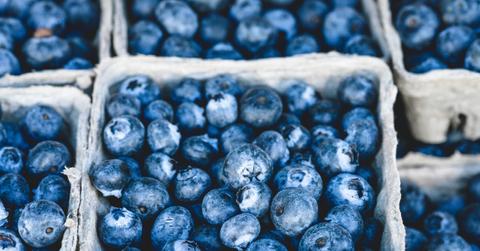Research Suggests The Best Thing You Can Do For The Earth Is Avoid Meat And Dairy
This study suggests that a vegan diet may be best for the environment.
Updated Nov. 21 2019, 2:14 p.m. ET
Scientists have just released what is being called the most comprehensive study ever of the harm farming does to the planet, reports the Guardian, as published in the journal Science. The analysis was based on a dataset culled from close to 40,000 farms in 119 different countries. The dataset covers 40 food products, which make up about 90 percent of all the foods humans eat.
They then judged the impact each one of these foods have on the environment, from farm to table. How much land use is required, the amount of carbon emissions released in its production and transport, how was fresh water it requires, and what level of water and air pollution is created by its industry.
Joseph Poore, who led the research out of the University of Oxford, told the Guardian the conclusion is undeniable. A vegan diet is one of the best things you can do for the environment.
“A vegan diet is probably the single biggest way to reduce your impact on planet Earth, not just greenhouse gases, but global acidification, eutrophication, land use and water use,” said Poore. “It is far bigger than cutting down on your flights or buying an electric car,” he added, because those actions only reduce greenhouse gas emissions.
“Agriculture is a sector that spans all the multitude of environmental problems,” he continued. “Really it is animal products that are responsible for so much of this. Avoiding consumption of animal products delivers far better environmental benefits than trying to purchase sustainable meat and dairy.”
The study suggests that if humans cut out dairy and meat consumption, the amount of farmland across the world would be reduced by 75 percent, which the Guardian says is equivalent to "the US, China, European Union and Australia combined." That's an enormous amount of land that could be used for any number of things, but one of the leading causes of wildlife extinction is the loss of natural habitat due to agriculture.
Overall, meat and dairy currently uses 83 percent of all farmland, and the production of both creates 60 percent of greenhouse gas emissions from agriculture. However, it only produces 18 percent of the calories and 37 percent of the protein needed. Even the most responsible meat and dairy production (such as grass fed beef) has a much bigger impact on the planet than conventional vegetable growing.
But there is a wide variability in how harmful meat and dairy production can be to the planet, depending on where it is being raised. On deforested land, beef cattle creates 12 times more greenhouse gases and 50 times more land than on natural pasture in places where grazing is optimal.
This could mean that meat and dairy consumption could simply be significantly reduced, without the whole world going vegan. Which is good, because reducing the environmental harm of farming is a huge challenge.
“There are over 570m farms all of which need slightly different ways to reduce their impact," said Poore. "It is an [environmental] challenge like no other sector of the economy.”
One suggestion is a label on products that reveal the environmental impact of their creation, so consumers can be aware of what they're doing and choose more sustainable options. There could also be subsidies for sustainable farming production and potentially higher taxes on meat and dairy.
There is a lot of misinformation in the marketplace, which Poore pointed out. Many people see fish as a more sustainable option, but in reality, the markets for fish farming in Asia and Europe creates significant problems.
“You get all these fish depositing excreta and unconsumed feed down to the bottom of the pond, where there is barely any oxygen, making it the perfect environment for methane production,” Poore said.
Veganism may be a largely personal choice, but how farm subsidies are distributed and how meat production is regulated is a governmental issue, and this new analysis can be used to lobby for change. Poore also just wants the information to be available to people.
“The reason I started this project was to understand if there were sustainable animal producers out there," he said. "But I have stopped consuming animal products over the last four years of this project. These impacts are not necessary to sustain our current way of life. The question is how much can we reduce them and the answer is a lot.”
